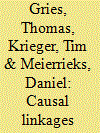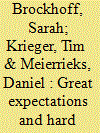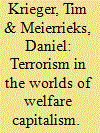|
|
|
Sort Order |
|
|
|
Items / Page
|
|
|
|
|
|
|
| Srl | Item |
| 1 |
ID:
107552


|
|
|
|
|
| Publication |
2011.
|
| Summary/Abstract |
We use the Hsiao-Granger method to test for terrorism-growth causality for seven Western European countries. In bivariate settings, the impact of economic performance on domestic terrorism is very strong. In trivariate settings, the impact of performance on terrorism diminishes. In general, we find that economic performance leads terrorist violence in robust ways only for three out of seven countries. Terrorism is almost never found to causally influence growth in bivariate and trivariate specifications. Our findings indicate that the role of economic performance in determining terrorist violence appears to have been important for some countries, whereas all attacked economies have been successful in adjusting to the threat of terrorism.
|
|
|
|
|
|
|
|
|
|
|
|
|
|
|
|
| 2 |
ID:
182539


|
|
|
|
|
| Summary/Abstract |
We examine the effect of class cleavages on terrorist activity by anarchist and leftist terrorist groups in 99 countries over the 1860–1950 period. We find that higher levels of political exclusion of the poor, our main measure of class conflict, were associated with higher levels of social-revolutionary terrorist activity during this time period. This finding is robust to an instrumental-variable approach and further robustness checks. We argue that class cleavages – in the form of the monopolization of political power by the rich – perpetuated and exacerbated the socio-economic ordeal of the poor, while simultaneously curtailing their means to effect relief in the ordinary political process. Consistent with our expectations, this provoked terrorist violence by groups whose ideological orientation highlighted concerns over class conflict, economic equality and the political participation of the poor. Indeed, our empirical analysis also shows that terrorist groups motivated by other ideologies (e.g. extreme nationalism) did not respond to political exclusion of the poor in the same manner, which further emphasizes the role of ideological inclinations in the terrorist response to class antagonisms.
|
|
|
|
|
|
|
|
|
|
|
|
|
|
|
|
| 3 |
ID:
141705


|
|
|
|
|
| Summary/Abstract |
This contribution investigates the role of education in domestic terrorism for 133 countries between 1984 and 2007. The findings point to a nontrivial effect of education on terrorism. Lower education tends to promote terrorism in a cluster of countries where socioeconomic, political, and demographic conditions are unfavorable, while higher education reduces terrorism in a cluster of countries where conditions are more favorable. This suggests that country-specific circumstances moderate the effect of education on terrorism. The results of this study imply that promoting education needs to be accompanied by sound structural change to positively affect (individual and society-wide) development and consequently reduce terrorism.
|
|
|
|
|
|
|
|
|
|
|
|
|
|
|
|
| 4 |
ID:
137026


|
|
|
|
|
| Summary/Abstract |
This contribution examines the role of capitalism in anti-American terrorism. It uses two theoretical frameworks, both of which contrast the pacifying effects of higher levels of capitalist development with the potentially destabilizing effects of a transition towards capitalism, but differ with respect to their definition of capitalism, capitalism’s interaction with anti-American terrorism, and its empirical operationalization. Using panel data for 149 countries between 1970 and 2007 and providing further system-level time-series evidence, this contribution finds no support for hypotheses derived from the classical capitalist peace literature. There is no evidence that anti-American terrorism increases with external economic liberalization or that it decreases with higher levels of economic openness. By contrast, hypotheses derived from economic norms theory find empirical support. Conceptualizing capitalism as social market-capitalism, this article finds that higher levels of market-capitalism are associated with less anti-American terrorism, while the process of marketization fuels it. Consistent with expectations from economic norms theory, the destabilizing effects of the marketization process may stem from the violent opposition of antimarket interest groups that have benefited from the pre-market order to the economic-cultural change initiated by a transition towards a market economy. These interest groups deliberately target the USA as the main proponent of market-capitalism, globalization, and modernity, where anti-American terrorism serves the purpose of consolidating their societal position, rolling back pro-market reforms and limiting the perceived Americanization of their communities. This contribution’s findings suggest that the USA may ultimately become a less likely target of transnational terrorism through the establishment of market economies, but should not disregard the disruptive economic-cultural effects of the marketization process in non-market economies.
|
|
|
|
|
|
|
|
|
|
|
|
|
|
|
|
| 5 |
ID:
101684


|
|
|
|
|
| Publication |
2010.
|
| Summary/Abstract |
This contribution argues that social policies ameliorate poor short-run and long-run socioeconomic conditions (e.g., unemployment, poverty, inequality, and dissatisfaction), thereby indirectly reducing terrorist activity. The authors empirically assess the influence of social policies (indicated by social spending and welfare regime variables) on homegrown terrorism for fifteen Western European countries during the 1980-2003 period. The authors find that higher social spending in certain fields (health, unemployment benefits, and active labor market programs) is associated with a significant reduction in homegrown terrorism, while spending in other fields (e.g., public housing) is not. Moderate evidence furthermore indicates that the different worlds of welfare capitalism differently affect homeland terrorism. Social democratic welfare regimes that create low levels of market dependence are on average less prone to domestic terrorist activity. The findings suggest that homegrown terrorism in Western Europe may also be fought by higher spending in certain fields and more generous welfare regimes.
|
|
|
|
|
|
|
|
|
|
|
|
|
|
|
|
|
|
|
|
|